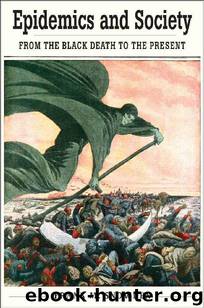Epidemics and Society (The Open Yale Courses Series) by Frank M. Snowden

Author:Frank M. Snowden [Snowden, Frank M.]
Language: eng
Format: epub
Publisher: Yale University Press
Published: 2019-10-21T23:00:00+00:00
Invalidism
Of all the effects of consumption on society, the most visible and pervasive was invalidism. At a stage in what Abdel Omran in the 1970s famously dubbed the “epidemiological transition,” or “health transition,” when chronic diseases were exceptional and infectious diseases the rule, protracted illnesses were also unusual, apart from tuberculosis. Consumption thus set a new standard for long-term maladies as the disease became the occupation of a lifetime. After diagnosis, the rest of a patient’s future suddenly became unknowable. Sufferers had to confront painful decisions about career, marriage, and family. Consumptives put normal responsibilities, friendships, and aspirations on hold in order to undertake in their place the new and all-consuming task of either restoring health or learning to accept an untimely death.
Highly suggestive of the nature of life as a consumptive are the plays of Anton Chekov (1860–1904). The Russian writer, who was a physician as well as a playwright, fell victim to phthisis. After falling ill, he abandoned his theatrical career in Moscow and departed for the Crimea in an ultimately vain attempt to recover his health on the milder shores of the Black Sea. Chekov wrote all five of his most famous plays—Ivanov (1887–1889), The Seagull (1896), Uncle Vanya (1897), The Three Sisters (1901), and The Cherry Orchard (1904)—during the period of his illness. Only the first, Ivanov, deals explicitly with consumption; but all of them have consumptive invalidism as their hidden but unmentioned autobiographical theme. It is no coincidence that all five portray protagonists who, like consumptives, are unable to act, as they find themselves trapped, waiting and waiting for the outcome of events beyond their control.
In The Cherry Orchard of 1904, the year of his death, Chekov examines the fate of characters whose lives are all mysteriously and unalterably paralyzed. Peter Trofimov is the eternal student incapable of completing his degree; Ermolai Lopakhin is a merchant unable to propose to his beloved; Lubov Ranevsky is a landlady powerless to save her estate from destruction as her resources are devoured by a ne’er-do-well lover; and Boris Simeonov-Pischin is a landowner unwilling to implement a plan to preserve his property from being consumed by debt. Speaking both for them all and for the invalid Chekhov, Simeonov-Pischin already declares in Act I: “I thought all was lost once and I was done in, but then they built a railway across my land . . . and paid me. Something else will come up if not today, tomorrow. Dashenka will win two hundred thousand. She’s got a lottery ticket.”19
Chekhov’s career as a patient is typical of middle- and upper-class consumptives during the “long nineteenth century.” Consumption set in motion one of the great population movements of the period—a movement known as “taking the cure.” A change of environment as a therapeutic intervention had an honored place in the medical armamentarium since Hippocrates’s famous work On Airs, Waters, and Places. Thus a consistent recommendation of physicians in dealing with consumption was “climate therapy”—the advice to travel to a salubrious destination.
Medical
Download
This site does not store any files on its server. We only index and link to content provided by other sites. Please contact the content providers to delete copyright contents if any and email us, we'll remove relevant links or contents immediately.
Good by S. Walden(3556)
The Social Psychology of Inequality by Unknown(3029)
The Checklist Manifesto by Atul Gawande(2852)
0041152001443424520 .pdf by Unknown(2845)
Get What's Yours for Medicare: Maximize Your Coverage, Minimize Your Costs by Philip Moeller(2728)
The Meaning of the Library by unknow(2571)
Guns, Germs and Steel by Diamond Jared(2370)
Borders by unknow(2313)
23:27 by H. L. Roberts(2249)
And the Band Played On by Randy Shilts(2209)
Being Mortal: Medicine and What Matters in the End by Atul Gawande(2129)
A Leg to Stand On by Oliver Sacks(2038)
The Hot Zone by Richard Preston(2019)
More Than Words (Sweet Lady Kisses) by Helen West(1867)
The Valachi Papers by Peter Maas(1858)
The Laws of Medicine by Siddhartha Mukherjee(1803)
The Andromeda Strain by Michael Crichton(1746)
Get What's Yours for Medicare by Philip Moeller(1740)
The Obesity Epidemic by Robyn Toomath(1676)
